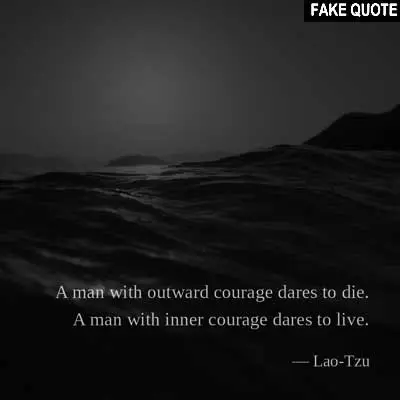|
Tao Te Ching
THE TAOISM OF LAO TZU
|
Fake Lao Tzu Quote"A man with outward courage..."
This is NOT a quote from Tao Te Ching:"A man with outward courage dares to die; a man with inner courage dares to live."
This is a strange statement. Inner courage can be understood as a psyche able to be courageous, which is the same as plainly saying courage. Where else would the courage be, if not in a person's inner conditions? But then, outward courage can be nothing but the expression of that inner capacity. So, they can hardly differ in nature. What might be intended is the difference between courage in deeds and courage in thought. Certainly, people who regard themselves as courageous can fail when put to the test, whereas many cowards show great bravery in times of crisis. But that would not explain how one leads to death and the other to life. If it's about being a daredevil, putting oneself in danger to impress others by showing courage, then it would make more sense to say that the courageous dare to die, and the cowardly dare to live. But that has less of a glorious flare about it.
In any case, Lao Tzu would not divide courage into an outward and an inner form. But he did write about two expressions of courage leading to those extremes in the outcome. It is in chapter 73 of Tao Te Ching. Here is my version:
The difference between the quote discussed here and Lao Tzu's words may seem minute, but it makes a huge difference in how the words are to be understood. Still, there is an English version of Tao Te Ching that contains the quote in chapter 73, but with the use of "inward" instead of "inner." It is Witter Bynner's book The Way of Life According to Laotzu: An American Version from 1944 (page 71):
Not knowing the Chinese language, he based his version on a number of extant translations — as any translator of a classic text, whether familiar with the language or not, needs to do — and explained in the introduction (page 15): "Laotzu should, I am convinced, be brought close to people in their own idiom, as a being beyond race or age." It is a praiseworthy ambition, but it brings the risk of deviating so far from the original intentions of the text that it gets closer to the translator than to Lao Tzu. The best translation of this classic is such that the readers experience at least some of the ancient Chinese context and are trusted to do some translating of their own, so to speak, into "their own idiom." Lao Tzu spoke to his contemporaries. If that is removed, readers are robbed of the possibility to draw their own conclusions as to how his words can be relevant today. It is not like Tao Te Ching was that easy to understand at the time and place of its emergence, either. Its obscurity contributes significantly to its continued attraction. Here are the other chapters where Witter Bynner's version of Tao Te Ching is discussed: At the center of your being, From wonder into wonder, and The way to do is to be.
Stefan Stenudd September 12, 2020.
More Fake Lao Tzu QuotesThere are many more fake Lao Tzu quotes examined on this website. Click the header to see a list of them.
Fake interview with the authorClick the header to read a "fake" interview with Stefan Stenudd, the author of Fake Lao Tzu Quotes.
About CookiesMy Other Websites:I Ching OnlineThe 64 hexagrams of the Chinese classic I Ching and what they mean in divination. Try it online for free.
Qi Energy ExercisesThe ancient Chinese life energy qi (chi) explained, with simple instructions on how to exercise it.
Life EnergyThe many ancient and modern life force beliefs all over the world explained and compared.
Taoismen på svenska
Other Books by Stefan StenuddClick the image to see the book at Amazon (paid link).
The Greek philosophers and what they thought about cosmology, myth, and the gods. |
 Tao Te Ching
Tao Te Ching Now it's a book, too!
Now it's a book, too! Tao Quotes
Tao Quotes Cosmos of the Ancients
Cosmos of the Ancients Qi — Increase Your Life Energy
Qi — Increase Your Life Energy Aikido Principles
Aikido Principles Life Energy Encyclopedia
Life Energy Encyclopedia Archetypes of Mythology
Archetypes of Mythology Stefan Stenudd
Stefan Stenudd